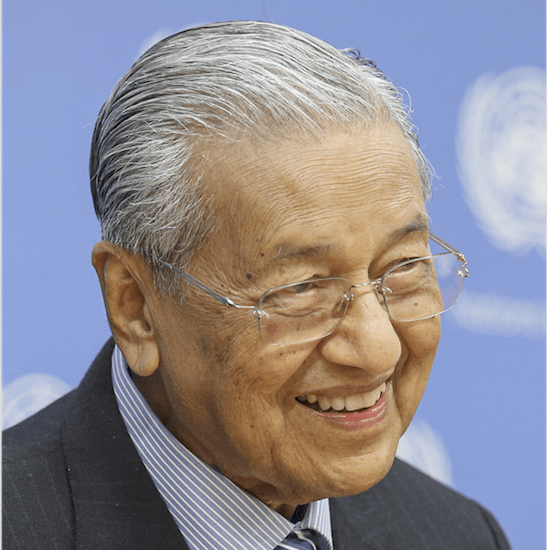Former Prime Minister Tun Dr Mahathir Mohamad appears to have diagnosed Malaysia’s economic maladies correctly and if the physician turned politician’s prescriptions are taken in the right doses, the Malaysian economy can be resuscitated.
In an exclusive interview with Business Today, Mahathir says it was time for Malaysian companies in selected industries to initiate trail-blazing efforts for venturing overseas and setting the stage to become world players.
The global landscape changed, with China and India coming into the economic foray and the scramble for foreign direct investment intensified and many countries that were once favourites for investors lost their shine.
Malaysia too lost its allure and attraction as a favourite investment destination. While it was sufficient for the government to provide political stability, good infrastructure, and a relatively cheap and educated workforce in the 70s, 80s, and 90s, this has changed since then.
NEW MARKETS
The tectonic shifts in the economic landscapes such as digitalisation, the knowledge economy, and neighbouring countries moving up the value chain have made attracting foreign direct investment (FDIs) more difficult.
With many newly independent countries freeing themselves from the shackles of the colonial domain, the economic trajectory for these countries was to depend on foreign investors for technology and skill, but it was time for Malaysia to “grow big and look for new markets”, says Mahathir.
Indeed, analysts have chimed in to say that many Malaysian companies such as the rubber glove companies that have become world-class players and others can emulate the industry leaders to set themselves on the world stage.
Forbes 2018 Global 2000 has listed 13 Malaysian companies. Among them are Malayan Banking Bhd (Maybank), Tenaga Nasional Bhd, Petronas Chemicals Group Bhd, Sime Darby Bhd, Maxis Bhd, and Genting Bhd.
Mahathir, a powerful advocate of emulating best work practices of Japan and South Korea again reiterates his stand on Malaysian companies looking east and taking a leaf from them in the onward corporate journey.
THE JAPANESE EXAMPLE
Many Japanese companies rose from the debris of world war two and became world global players, surpassing many western companies and Tun’s advice could not have been more timely.
Companies such as Sony had their humble origins and have now become global players.
In 1955 the transistor radio TR-55 went on sale, entered the US stock exchange and expanded into Europe, Australia, and went all over the world.
Another Japanese Multinational, Panasonic Corporation, formerly Matsushita Electric Industrial co-founded by Kōnosuke Matsushita in 1918, started as a lightbulb socket manufacturer.
To reflect the firm’s status as a formidable global player in the electronics industry the National name was changed to Panasonic in 2008. Now in its 100th year, Panasonic operates 495 subsidiaries and 91 associated companies worldwide. And it has 257,533 employees, of which 152,701 are overseas.2 Apr 2018.
These are among the many multinationals that had become formidable global players in the world and that “there were so good that they defeated the west”, stresses Tun Mahathir
Mahathir hoped these companies would serve as examples for Malaysian companies to emulate and “go big and serve the world markets.”
Economists have also chimed in to say that it was time for Malaysia to pay attention to agriculture considering the vast potential and they say that the agricultural sector is still at a subsidence level.
BIG HOLDINGS
They add that while in developed countries farmers and fishermen were the affluent segments of the population; it was not so in Malaysia where there is the need to address structural problems.
Mahathir offers his counsel once more, stating that the difficulties in Malaysian agriculture were smallholdings that were inefficient, and that no attempts were made to address this, and that mixed farmings were not employed to mitigate this.
Looking at successes in Malaysia, these smallholdings must be amalgamated into big estates as evidenced by the big estates that were managed by the British that grew Rubber and Oil Palm.
His thinking is, “If they are all farms, holdings are merged with 10,000 to 20,000 acres of the lands, all the small-holdings can be merged into big holdings such as cooperatives and estates and grow the fruits and vegetables of the right crops, it will enrich them.“
While the many initiatives that Mahathir planned for the country were in the offing, the government came to an abrupt end and the much-needed transformation did not take place
Mahathir adds that “there were groups that wanted to build a Muslim government, adding that just as the Pakatan government was to start its agricultural initiative, “they pulled the carpet right under our feet”.










